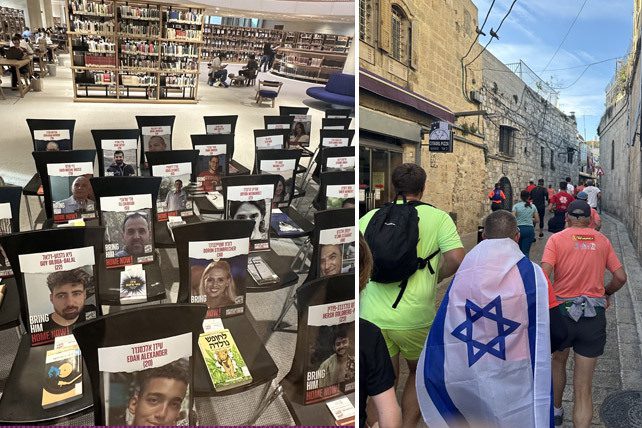“There’s a very strong sense of brotherhood and camaraderie,” said Sheizaf, also noting that as a radioman in the military, he was looking forward to seeing his commander, who was injured in the same attack that he was. “We are very close,” Sheizaf said.
“I remember lying in the room in the house where I was injured. Then I made this promise to myself that I’m going to get back into running,” said Sheizaf. If for some reason he is unable to run again, he still plans to “find some sport that I can practice, and I will keep on being a sportsman.”
“It can sound like a cliché,” said Sheizaf, “but it really makes you appreciate life and appreciate how good my condition is today.”
Next to share his story was Itzik Weksler, a 41-year-old personal trainer and a married father of five. Weksler’s company is responsible for training the mayor of Jerusalem, Moshe Lion; Lion and Weksler also run 10Ks together. “He didn’t want to give up on running side by side with me as his trainer,” said Weksler, saying the two will run the Jerusalem Marathon “with many injured soldiers.”
Weksler said he is “a commander in the elite Maglan unit of the Israeli Army” and that he was called up to serve two days after Oct. 7. He fought until he was injured when a rocket hit a vehicle he was in and he was ejected from that vehicle. Two soldiers died and five were injured, including Weksler, who was hit by shrapnel in his ear and chest.
“Shrapnel affected the nervous system of my left ear and left me deaf on one side,” he said. “I am still undergoing rehab for balance and am learning to live with the injuries and the rehabilitation process.”
The commander gave words of tribute to friends of his who had fallen in battle, after which he and Sheizaf took questions. Journalists were curious to know how the soldiers feel about members of the Israeli population who refuse to fight, anti-Semitism throughout the world, and potentially returning to fight once they have recovered.
Foster asked Sheizaf and Weksler what they wish “the rest of the world would know about what you and the country are facing?”
Weksler responded by telling a story in Hebrew that was translated for the group. He said at one point he was at the Indonesian hospital near the Jabalia refugee camp, chasing 20 terrorists who were hiding in the NICU. He told his soldiers not to harm innocent people, so they had a dilemma about what to do. They decided not to shoot until they left the NICU so as not to harm the babies. Weksler observed that the terrorists did not behave in this way on Oct. 7.

